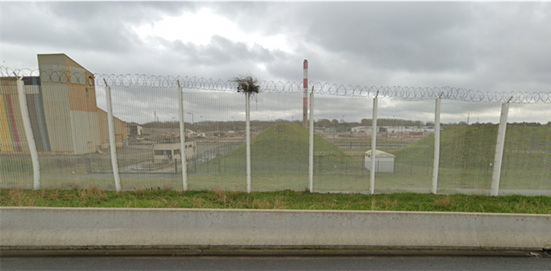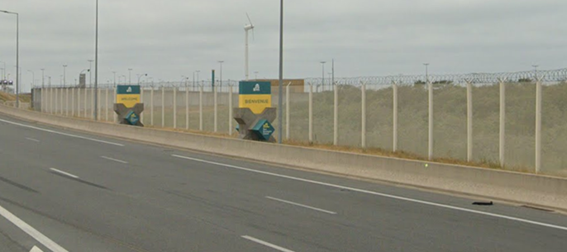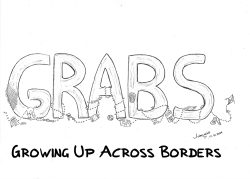Insights and Challenges at the UK-France Border
This blog post shares some initial findings and reflections from our research scoping trip to Calais and Dunkerque at the end of January 2025.

At the end of January, our team embarked on a scoping trip to Calais and Dunkerque on the north coast of France as part of our ongoing research into the border. The trip was the first of several planned field visits to key sites, with the goal of gaining an in-depth understanding of the challenges faced by people on the move, as well as the grassroots organisations supporting them.

As we approached Calais, the industrial and militarised landscape visually dominated the natural coastal environment. The road leading into the city was lined with tall fences, topped with razor and barbed wire, immediately indicating the security measures defining this border zone. We passed signs reading “Welcome” and “Bienvenue,” (pictured above) but the looming security infrastructure behind them indicated a different experience of Calais, one of hostility, immobilisation and control.
The shipping port was visible behind the vast fences, a central feature of the region. Yet, amidst the industrial and securitised landscape, there were several remarkable moments where the natural, non-human environment contrasted the unnatural, industrial, state security structure dividing the land. We saw birds’ nests built within the violent structures, nestled within the twists and curves of the razor wire and barbed wire. The industrial landscape was interrupted by fragmented views of the sea and beaches behind the vast fences.
As we drove through Calais and Dunkerque, we felt the constant presence of the border. Both in terms of the State’s border security measures and the human consequences; besides the fences and razor wire, we saw tents and makeshift living sites, road signs warning drivers about people in the road, patrol vehicles and armed police. These visual indications of the border underscored the daily challenges faced by people on the move, as well as the efforts of local organisations trying to provide support in a heavily securitised and controlled environment.
Meeting with Grassroots Organisations
During our time in Calais and Dunkerque, we met with several grassroots organisations operating locally. These organisations, which include few paid staff and many volunteers, operate at the forefront of humanitarian efforts, providing essential solidarity, support and care to people controlled by the border. From providing water, food and clothing, to police monitoring and responding to emergencies, these organisations are crucial in providing the support that the state fails to guarantee.
These organisations face significant challenges of their own, hindering their ability to meet the needs of the people they support. One of the most pressing issues is a lack of stable and sufficient funding. Many of the organisations rely on donations and grants, which often fluctuate or fail to cover the full extent of their work. This funding instability leads to a high turnover of staff and volunteers, complicating the delivery of long-term, sustainable support. Organisations manage a training cycle in which new volunteers are trained and gain experience before working independently. However, since the volunteers leave after 1-2 months, organisations must continuously train new replacements. This disrupts the continuity needed to address ongoing issues.
The French state plays a critical role in shaping the operational landscape for these organisations. There is deep frustration and anger with the authorities, particularly in relation to the UK-France agreements and the heavy-handed approach taken by police and border forces. The “zero fixation point” policy, which aims to prevent the establishment of long-term living sites, has exacerbated the situation. This policy makes it difficult for organisations to provide basic services or even establish any form of infrastructure for the people they assist (access to drinking water, toilets, personal hygiene).
The Harsh Realities: Police Violence and Systematic Evictions
Another unsettling discovery during our trip was the routine and systemic violence perpetrated by the police. Intimidation and displays of power were evident as we spoke with people living in the encampments. Police presence was ubiquitous, and frequent evictions of migrants were reported. In Calais, these evictions occur roughly once every 48 hours, while in Dunkerque, they happen every three weeks. In 2023, 933 tents, 209 tarpaulins, and 106 sleeping bags were seized by the police. This relentless cycle of evictions exposes people to constant police harassment and intimidation, forcing people to remain vigilant and constantly move.
Besides destroying living sites, and confiscating personal items, the police and the local government place an emotional toll on people working for the organisations. There is a sense of helplessness as under-resourced, community organisations attempt to tackle the obstacles imposed by the French authorities, bolstered by UK cash injections. The state’s policies not only avoid catering to the needs of the people controlled by the border, but French authorities (police and local government) actively sabotage the work of the local organisations.
Key Findings and Ongoing Struggles
Our visit to Calais and Dunkerque revealed a number of key findings that will shape the direction of our research moving forward:
- Police Violence and Intimidation – The heavy-handed approach of law enforcement, including intimidation tactics and the regular use of force during evictions, is a significant barrier for those living in the encampments. Police regularly puncture boats and seize lifejackets, and water, hygiene and sanitation infrastructure is regularly the target of deliberate damage by police and sometimes by local residents.
- The Impact of the UK-France Agreement – The bilateral agreements between the UK and France have resulted in increased resources to be used by French authorities to control people on the move. This has exacerbated the challenges faced by both people on the move themselves and the organisations working to support them.
- The “Zero Fixation Point” Policy – This policy, which prevents the establishment of long term living sites, has created a situation where organisations struggle to meet basic needs like shelter and healthcare.
- Exploitation of Young People – One of the most concerning aspects of our findings was the precariousness of young people in the area. Young people, many of whom are unaccompanied, face a heightened risk of abuse and exploitation due to the lack of adequate support structures. The failure of the French authorities was highlighted by the European Court, where it was found that the French authorities failed to provide adequate protection and care for a 12-year-old unaccompanied child in 2016 resulting in inhuman and degrading treatment.
- Challenges Faced by Grassroots Organisations – These organisations are doing critical work in extremely difficult circumstances, but they face significant hurdles. Funding is inconsistent, staff turnover is high, and the state’s policies and police harassment and intimidation make their efforts even harder. Despite these challenges, the people we met indicated their dedication and solidarity.
Conclusion
Our scoping trip to Calais and Dunkerque has provided us with an important perspective on the situation at the border. The interplay between human resilience and state-imposed barriers is evident in every corner of these cities. As we move forward with our research, we are committed to highlighting the systemic issues at play and supporting the organisations working to provide solidarity and support to the people controlled by the State and its bordering practices.
We will continue to monitor the situation closely, and our next steps will involve meeting with local organisations in other key areas of interest and exploring ways to implement our findings in the development of our research.

[…] I hold visa privileges that are evident even in the simple act of taking a train. In January, our team had been in Calais, on the other side of the Channel, where people on the move were stuck, facing evictions and […]
[…] yet hopeful, sight of bird nests built on top of razor wire fences in Calais (you can read Izzy’s blog post on our trip to Calais in January). After the illustration, I went ahead and created a composite with a long list of these troubling […]